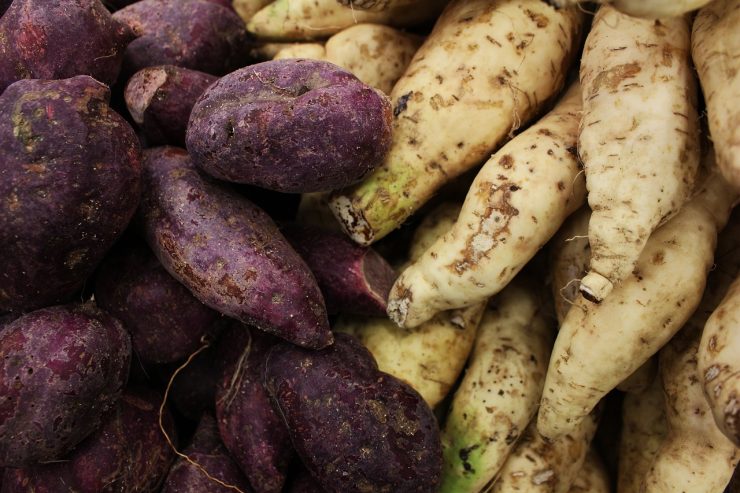You’ve probably heard the terms “yams” and “sweet potatoes” tossed around, but are they really the same thing? And how do they stack up against good ol’ regular white potatoes?
Let’s break it down:
First off, sweet potatoes are those vibrant orange or reddish root veggies you see at the store. They’re part of the morning glory family, totally unrelated to both yams and white potatoes. Originating from Central or South America, sweet potatoes rock a longer, tapering shape with smooth skin in various hues – from tan to purple. Plus, their flesh can range from white to orange to even purple. When it comes to taste, sweet potatoes are softer and sweeter compared to their counterparts.
Now, onto yams – these tuberous fellas hail from a different family altogether, the lily family to be precise. Originating in Africa and Asia, yams come in a whopping 600 varieties. Picture a more cylindrical shape with rough, bark-like skin that’s a pain to peel. Unlike sweet potatoes, yams aren’t sweet or smooth; they lean more towards dry and starchy.
White potatoes, on the other hand, are probably a staple in your pantry. Part of the Solanaceae family (think tomatoes and peppers), they’re not related to sweet potatoes or yams. With varieties like russet, red, yellow (or Yukon Gold), and purple, white potatoes offer a whole different nutritional profile.
Now, here’s where it gets interesting…
Sweet potatoes steal the spotlight in the nutrition department. Packed with beta-carotene (hello, vitamin A precursor), vitamin C, manganese, and more, they’re a powerhouse of goodness. Plus, their high fiber content helps stabilize blood sugar and makes them a hit for diabetics.
Yams, while calorie and carbohydrate-rich, don’t quite match up to sweet potatoes in terms of nutrient density. They do offer potassium and manganese, and some research suggests they may aid in hormonal balance for women.
And white potatoes? They’re no slouch either, boasting vitamin C, folate, potassium, and manganese. But they don’t pack the same antioxidant punch as sweet potatoes.
In the blood sugar battle, sweet potatoes come out on top with a lower glycemic index compared to white potatoes.
So, who takes the crown?
By a slim margin, sweet potatoes emerge victorious in the nutrition game. But don’t count out yams and white potatoes – they’ve got their own perks when prepared right.
The bottom line? Whether you’re team sweet potato, yam, or white potato, just remember to opt for healthier cooking methods (baked over fried, please!) and maybe add a dab of grass-fed butter for good measure.
And hey, if you’re curious about what US heart surgeons have to say about these carb-loaded wonders, we’ve got the scoop below!
US Heart Surgeon Says Carbs are NOT the Problem (This “Health Food” is)…
According to this world-renowned Heart Surgeon below, a good portion of your weight gain, brain fog, and digestive issues may stem from a SINGLE vegetable you eat…
Listen, I realize this sounds far-fetched, but the science is groundbreaking. In fact, we now know of at least one so-called “health food” that could be wreaking havoc on your insides (and your results). What’s worse, it’s probably in your kitchen right now!
And today, my trusted colleague, Dr. Steven Gundry, is pulling back the curtain on exactly what it is:
This Vegetable Could be the #1 Danger in Your Diet












